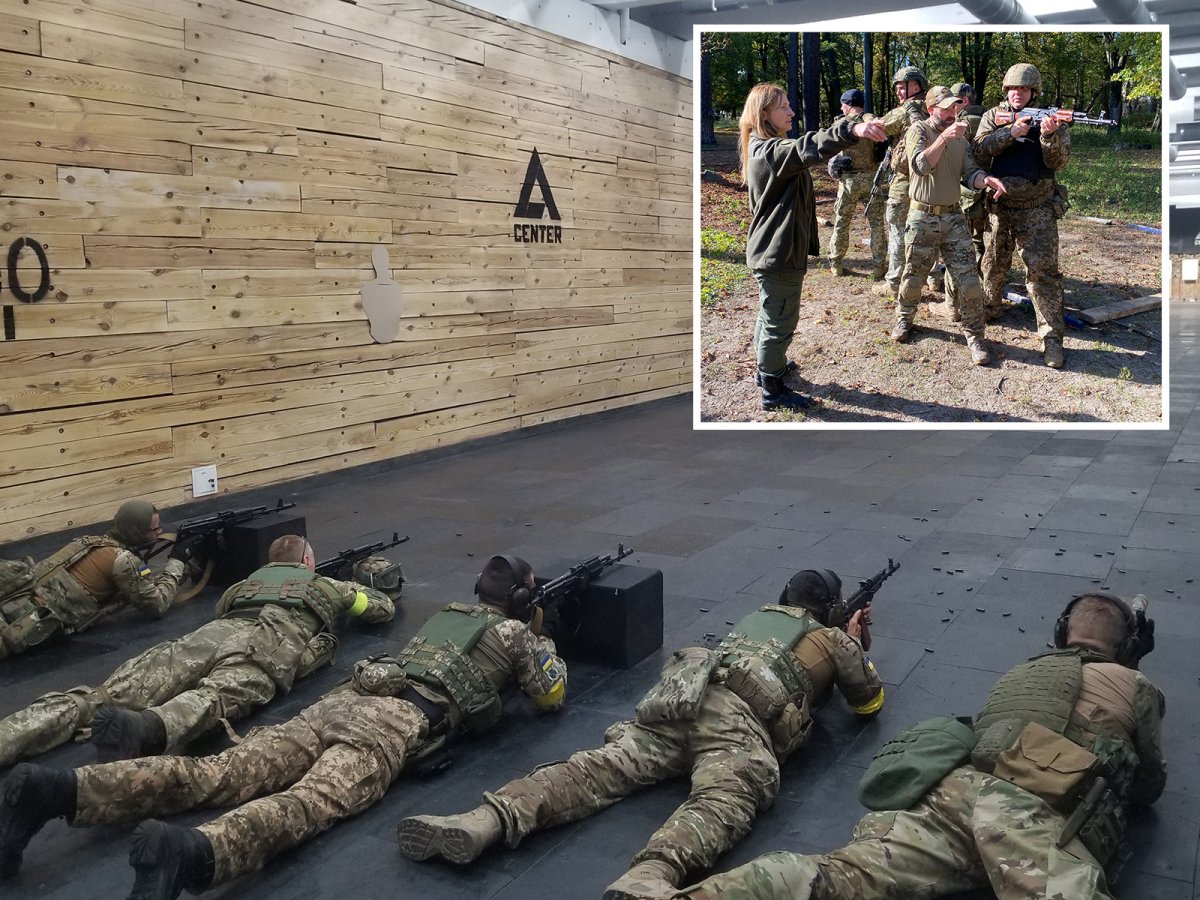The battle for Bakhmut in Ukraine's war-torn east has become one of the most brutal chapters of Russia's disastrous invasion of its neighbor, as Ukrainian defenders burrowed into lines of fortified positions and mud-swamped trenches fight off waves of Russian assault units picking their way across the shell-scarred landscape.
The grinding assault on the city and its surrounding area is a rallying point for Russia's military bloggers and propagandists, and a showcase of the capabilities of the Wagner Group and leader Yevgeny Prigozhin, one oligarch ally of President Vladimir Putin whose profile has increased dramatically since February 24.
Prigozhin and his Wagner fighters—their ranks swollen by the mass recruitment of Russian convicts—seemingly have another target in their sights: the Mozart Group NGO which is helping train Ukrainian troops and evacuating civilians from the front lines, including around Bakhmut.
Prigozhin wrote on Telegram in November that "American mercenaries" led by retired U.S. Marine Corps Colonel Andrew Milburn had taken command of a badly mauled Ukrainian brigade. The same day, Mozart's website suffered a DDOS attack, and Prigozhin's allegations were quickly picked up by several Russian media outlets.

Milburn told Newsweek on Tuesday that "it's not inconceivable" that Wagner is targeting Mozart volunteers operating in the east of the country.
"There's no hotel in Donbas now that will let us stay because they've been told we're being targeted," the retired Marine Corps colonel said.
"We have had three hotels that we stayed in hit by missiles, which could have been random," he said, noting one hotel strike occurred the day after a Mozart group checked out. "They could definitely be targeting us, which seems like a lot of resources to focus on a group that's doing mostly humanitarian work."
"None of these threats or all the b******* flying around on Telegram are going to affect our operations at all."
Wagner vs. Mozart
Milburn dismissed Prigozhin's description of Mozart as a private military company. "People call us a PMC because that's all they have as a frame of reference," he said. "We don't carry weapons, our tasks are humanitarian—and I mean, seriously, legally humanitarian."
Mozart, he noted, is a 501(c)(3)-registered charitable organization.
"Any mercenary would scoff at what we pay our guys...the Ukrainian soldiers we train get paid more than our guys," Milburn added. "We have a higher emotional intelligence, we recruit a different sort of person. We're not armed, we don't fight. We have nothing in common with other PMCs."
The Mozart Group's name was intended as a counterpoint to Wagner, whose fighters adopt neo-Nazi imagery and have developed a reputation for extreme brutality in operations in Syria, Libya, and the Central African Republic. Previously used as a deniable, shadow arm of Russian foreign policy, the group has emerged as one of Moscow's more effective and feared formations in Ukraine.
The name, Milburn said, probably has drawn added attention from Prigozhin and his fighters. "But I think really what draws their ire isn't the name, it's what we're reporting."
The Ukrainian military closely controls what non-military personnel is allowed close to the front. Journalists are among those facing strict limitations on where they can go and what they can cover.
"We're the only ones that are regularly posting pictures and footage and reports of what is going on, which is an absolute annihilation of Ukrainian frontline towns to an extent that I have not seen in the media," Milburn said.
"Last week, we were called in to take out the body of a man who had been set alight by the Wagner Group in front of his family. These stories are not apocryphal, this happened."

"Very Close Calls"
Mozart volunteers are training Ukrainian forces in combat skills while other groups ferry civilians away from the gradually shifting front line in the east. The extraction teams thread their way through constant dangers.
"They've got units on overwatch/. We can be engaged by direct fire within up to four kilometers, and they have drones overhead and aircraft," Milburn said. "We're like mice trying to find our way through a maze with this giant, malevolent cat pouncing and whacking at every potential pathway."
Thus far, Mozart members have escaped harm outside "a few light frags from shrapnel," Milburn said. "We had a volunteer who left us to the International Legion who was very severely wounded in the same area around Bakhmut. But we have been lucky. Luck is the only way to explain it because we've had some very close calls."
Milburn said the group has evacuated between 600 and 700 people from dangerous areas since May.
Those stuck in the war zone don't always want to leave. "It is often a hard negotiation to get people to leave their homes," Milburn said.
"This is a segment of the population that feels somewhat alienated within Ukraine, and they hate the Russians now," he said. "They're terrified of the Russians. But often they don't know how close the Russians are. When we tell them they've got Russians within 1,000 meters they are incredulous. Often they don't realize how close the enemy is until they open their door one morning and find them in their towns if they're still alive."

'Horrible and Miserable' Bakhmut
Winter has turned an already inhospitable environment into a nightmare, Milburn said. "These people are stuck without food, water, heat; every single window of every single building without exaggeration is shattered. It's just hard to believe."
"Bakhmut is like Dresden, and the countryside looks like Passchendaele," he said, referring to the German city destroyed by allied bombing in World War II and the infamously muddy and bloody World War I battlefield. "It's just a horrible and miserable place."
Ukraine closely guards its casualty figures, but its forces are believed to be suffering badly around Bakhmut.
"They've been taking extraordinarily high casualties," Milburn said of the units training with Mozart. "The numbers you are reading in the media about 70 percent and above casualties being routine are not exaggerated."
Despite their "tremendous morale," Milburn said the defenders "have an acute 'regeneration problem,' which means getting new recruits into the line as quickly as possible." This means those being thrown into the fight have little beyond basic training.
"Typically about 80 percent of our intake who are coming off of the line have never even fired a weapon before," Milburn said. "We've got our work cut out for us."
Beyond the immediate dangers, a lack of funds is a pressing concern, according to Milburn. "I'm terrified we're going to run out of steam early in the new year," he explained, noting that sourcing, repairing, and replacing damaged vehicles is the biggest expense.

The evacuation teams run on a budget of around $2,000 per week, with the whole Mozart project costing around $170,000 per month, Milburn said.
"We are filling a niche that no one else is filling," he said. "We're an absolute no-brainer for funding from Western governments...What the hell is stopping the U.S., or U.K., or European Union governments from reaching out and saying: 'Let us help you?'"
Mozart has so far been reliant on small donors, contributing directly or via its "alter ego" organization Task Force Sunflower, a non-charitable entity that enables tax-exempt donations.
Meanwhile, Milburn said his team would continue operations through the Christmas and New Year period, with a plan—funding dependent—to expand training operations in early 2023. He is in regular contact with Ukrainian intelligence and military officials about the growing threat posed by Wagner.
"Intelligence is not always that precise or clear," Milburn said. "The only thing we can do is choose to go in or choose not to go in. To date, we have never chosen not to go in."
About the writer
David Brennan is Newsweek's Diplomatic Correspondent covering world politics and conflicts from London with a focus on NATO, the European ... Read more



